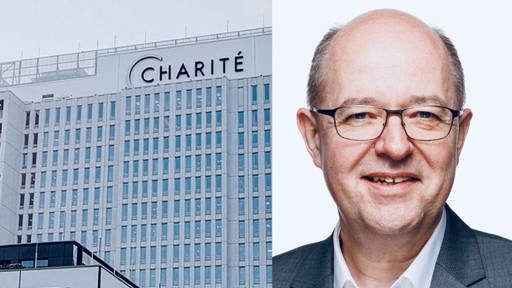Only one of the world's top 10 smart hospitals is based in Europe: Charité – Universitätsmedizin Berlin. Charité wss ranked eighth by Newsweek and Statista last July. According to Newsweek and Satista Charité stands out for its ambitious digital strategy, which includes reaching HIMSS EMRAM Level 7 by 2028 (now it’s 5.6). To achieve this, the hospital is working toward the complete structured digitization of all medical records, along with the development of a unified data platform. The goal is to ensure that high-quality, structured clinical data can be used effectively with algorithms and AI-based tools. We dive into how Charité reached the top 8 position in this second part of an interview with Dr. Peter Gocke, Head of Digital Transformation at Charité – Universitätsmedizin Berlin.
We've talked a lot about AI. Let’s look at another new technology: quantum. The Cleveland Clinic already has a quantum computer. Do you envy your US colleagues?
“I envy their overall data quality. Even if we had the same quantum computer here, it wouldn’t deliver similar results because our data isn’t structured enough. It’s like giving me Max Verstappen’s Formula 1 car, and I’d drive it on regular roads – I wouldn’t even finish a lap on the Nürburgring (from the editor: Nürburgring is a racetrack located close to Nürburg, 650 kilometers from Berlin). The problem isn’t the hardware; it’s the data and processes.”
And if a company offered you a quantum computer?
"I’d ask what data it needs and what it costs. If I don’t have the data it requires, it isn’t beneficial. Some industries have already aligned their processes with their data flows. In hospitals, we still have to get there. It is often said that data is the oil of our times. Today, using unstructured data is like fracking, I mean, expensive and inefficient.“
With so many new apps and decision-support tools emerging, how do you decide which ones to adopt?
“That decision lies with the users and clinicians because they know best if a tool helps. Our IT and admin teams don’t use these tools directly. What we can do is evaluate the technology: is it secure, compatible, and compliant with data protection regulations.”
What are the Charité’s current digitalization priorities?
“We’re replacing our entire hospital information system because the current vendor will no longer support it. This is a huge opportunity. We’re moving away from systems focused on billing transactions toward modular, process-oriented platforms. Also, we’re investing in the telematics infrastructure, which enables communication across Germany’s fragmented healthcare sectors, between hospitals, general practitioners, and public health services. For the first time, even patients will be part of that and finally have their own digital system access.”
What didn’t work well in the previous version of the electronic patient record?
“It was designed more like a document storage system. Access was difficult, and patients had to actively request it (opt-in), which doesn’t work. Other countries failed with this, too, and eventually switched to an opt-out model. Also, there was no consideration of complete digital workflows. To treat a patient remotely, I require additional tools beyond EHR, including video consultations, e-prescriptions, and a verified digital identity.”
What exactly does your role as Head of Digital Transformation entail?
“It’s internal consulting and coordination. The IT department doesn’t transform the hospital alone. We coordinate between leadership, IT, and clinical departments. Initially, IT had to manage all digital projects alone. That didn’t work. Now we have dedicated project managers and a central project management office - a much better structure. Additionally, we required scalable training tools to support our 20,000 staff, such as digital learning platforms."
"We don’t have the hospital digitized by the IT department. We empower departments to transform themselves by creating the right conditions—coordination, structure, and scalable tools.”
Is it good or problematic that companies like Apple and Samsung are collecting health data via wearables, stepping into the role of invisible care providers with no accountability?
“Whether good or bad, it’s happening. The key issue is what happens to the data: Who has access? Who can use it? If we want healthcare to be responsible for people’s well-being, data usage must be aligned with that goal. But we won’t stop companies from offering insights directly to users either. My smartwatch helps me track my training goals, which no one else does. Still, when it comes to health, data usage needs transparent purpose limitations."
"The data from wearables might not be medically precise, but they’re excellent for identifying trends. And trends are where early interventions start.”
As patients collect more data than doctors, will hospitals need to access this data to better understand their patients?
“Definitely - especially in mental health, phone sensors already help detect behavioral changes. We’re starting to send medical devices to patients’ homes to monitor them in their daily environments. Health isn’t created in hospitals, it’s preserved in people’s lives.”
Even if most of the wearables aren’t medical devices?
“Some are surprisingly good. Even one-lead ECGs from apps are considered reliable by our cardiologists. Even subjective data, such as patient-reported outcomes – like “how are you feeling from 1 to 5” – are helpful, and wearables often operate on that level.”
And what about the newest AI advancements, such as AI agents managing workflows like pre-op planning?
“That’s no longer science fiction. It’s happening where standardized interfaces exist. For example, if an agent detects that a patient is ready for surgery in ten minutes and books a transporter, that's possible. But we still lack those interfaces. Still, I believe it will become standard soon.”
What excites you about digital transformation?
“I think it’s the growing public awareness of data’s value. Even the best data is useless if it’s locked away. As for technology, generative AI is fascinating, though I’m not yet sure if the results justify the energy it consumes. But that could change. Let’s think about the early versions of electric cars, which were inefficient. But today they’re game changers.”
What’s your vision of Charité in 2030?
“In 2030, I envision Charité not just as a physical location, but as a service accessible from anywhere. You’d have a Charité account through which you access healthcare, wherever you are. That account could become the most valuable healthcare account globally.”
Like a “digital door” in the Mayo Clinic?
“It’s the reverse. It’s not about entering a digital front door but about having an always-accessible service as a digital companion for healthcare anywhere. As long as I have my phone, I can receive care.”
Haven't read the first part of the interview? Click here.









